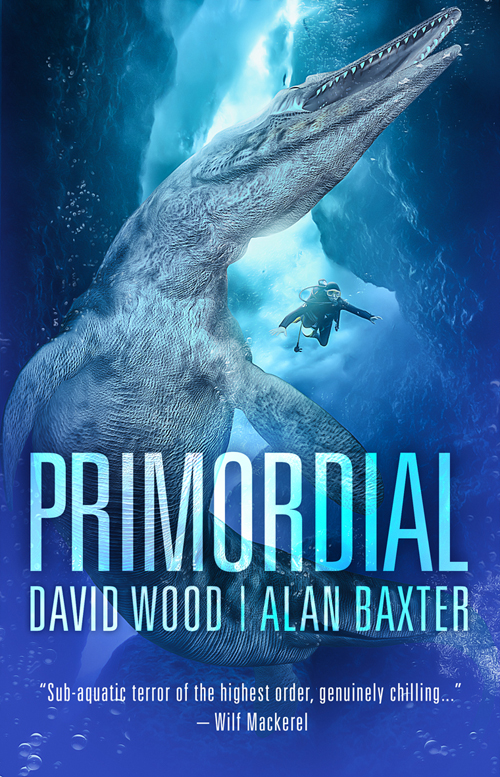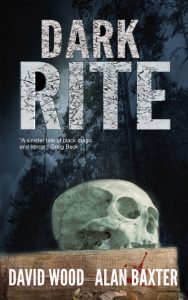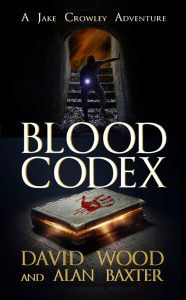 As many of you know, I recently co-wrote a book with nine(!) authors (“Into Tordon” by Z.F. Kingbolt), so am particularly fascinated by collaborative writing at the moment. A few weeks ago, Alan Baxter and David Wood released the cover for their upcoming collaborative novel, “Primordial”. It looks amazing! Here’s the blurb:
As many of you know, I recently co-wrote a book with nine(!) authors (“Into Tordon” by Z.F. Kingbolt), so am particularly fascinated by collaborative writing at the moment. A few weeks ago, Alan Baxter and David Wood released the cover for their upcoming collaborative novel, “Primordial”. It looks amazing! Here’s the blurb:
When eccentric billionaire Ellis Holloway hires renegade marine biologist Sam Aston to investigate the legend of a monster in a remote Finnish lake, Aston envisions an easy paycheck and a chance to clear his gambling debts. But he gets much more. Something terrible lives beneath the dark waters of Lake Kaarme, and it’s hungry. As the death toll mounts, Aston faces superstitious locals, a power-hungry police chief, and a benefactor’s descent into madness as he races to find the legendary beast of the lake
So how did David and Alan go about collaborating over the writing of their awesome books? To find out, I asked them…
When you write collaboratively, how do you make the decisions? Do you both have an equal say? What happens when there’s a stalemate?
Alan: We’ve done it differently for different projects, but fundamentally we work out an outline first, knock that back and forth, then get into the actual writing. There’s not really been a stalemate yet, as we’re both fairly flexible when it comes to making the story work. It does tend to be Dave putting in more work on the initial outline.
David: When issues come up, we go back-and-forth until we figure it out. Sometimes it’s a simple matter of an email exchange. Other times we’ll have a Skype chat if we need to think something through. As Al said, we work fairly well together and both have a pretty good feel for what makes a story work.
Did you agree that was how things were going be before you started writing, or did your working relationship evolve into that system, and were there any hurdles with that?
Alan: It just kind of grew naturally that way. To be honest, the whole thing has been fairly hurdle-free thus far!
David: For whatever reason, we work well together and are pretty good at working in a way that emphasizes our respective strengths. Now that we’ve written three books together, we’ve evolved to a point at which I do most of the heavy lifting in terms of plot, Al does most of the prose, and we share equally in other aspects.
With the collaborative writing I’ve done, it’s my job to ensure the story has a consistent voice and tone. With yours, does one person do a ‘voice’ or ‘tone’ edit, or do you write so similarly that a consistent voice and/or tone comes naturally, and have you experienced any hurdles with that?
 Alan: We edit what the other wrote, then write our bit and so on. The tone tends to settle down naturally that way. Our styles are similar enough that it works, which is partially why we’ve continued to collaborate. Although, when it comes to regional stuff, Dave does all the last pass on the US dialogue and I do all the British and Australian to get that right.
Alan: We edit what the other wrote, then write our bit and so on. The tone tends to settle down naturally that way. Our styles are similar enough that it works, which is partially why we’ve continued to collaborate. Although, when it comes to regional stuff, Dave does all the last pass on the US dialogue and I do all the British and Australian to get that right.
How do you cope emotionally with working collaboratively, where egos and ideas must remain subservient to ‘the story’?
Alan: We are without ego and live to serve the story.
David: Something we preach on our podcast is to not be “precious” about your work, and we do a pretty good job of living by that rule. We each respect what the other brings to the table.
Which is the hardest part of collaborative writing for you – conceptual, writing, editing, production or marketing – and why?
Alan: It’s all hard in different ways. I’m not sure there’s any one part that’s the hardest except for the part that’s hardest with all writing – getting it noticed!
David: Living on opposite sides of the world poses a challenge. If I’m working in the morning and need to discuss something with Al, I have to wait eight hours or so until he wakes up. Otherwise, it’s pretty smooth.
What would be your biggest tip for anyone thinking of writing collaboratively?
 Alan: Don’t. But seriously, only work with someone you know you can match in terms of time, style, content, and so on. And make sure there are no egos in the way. It’s not easy to find someone like that.
Alan: Don’t. But seriously, only work with someone you know you can match in terms of time, style, content, and so on. And make sure there are no egos in the way. It’s not easy to find someone like that.
David: Collaboration isn’t for everyone. You’re marrying your ideas, styles, and work habits, and just like any marriage, there has to be mutual respect, give-and-take, and compromise. That’s difficult for many authors.
How do you manage to present such a united front when talking about your collaborative writing to the reading public? Do you agreed on what’s best to say or not say, such as protecting spoilers and being respectful of each other as co-authors?
David: When in doubt, I just do whatever I want because I know Al’s not going to spend the money on an airline ticket just to come over here and punch me. More seriously, because we’ve been podcasting together for years, we’ve literally spent hundreds of hours exchanging ideas about writing, publishing, and professionalism, so we’re of like minds on most issues, and we check in whenever we’re uncertain about something.
Alan: Actually, you make a good point there about the podcast. I hadn’t really thought about it, but we have spent so long talking this stuff through that we’re on the same page on pretty much every aspect of the business. Maybe that’s the secret to collaboration – do 100 hours of podcasting together first!
Thank you so much David and Alan! “Blood Codex” and “Dark Rite” are available from all good bookstores right now! “Primordial” is due for release through Cohesion Press in 2017.
Interested in what other authors have to say about collaborative writing? I’ve also interviewed Margo Lanagan and Deborah Biancotti about their collaboration with Scott Westerfeld, and the ‘Alice Campion’ authors: Jenny Crocker, Jane Richards, Jane St Vincent Welch and Denise Tart. Click to read those interviews!





